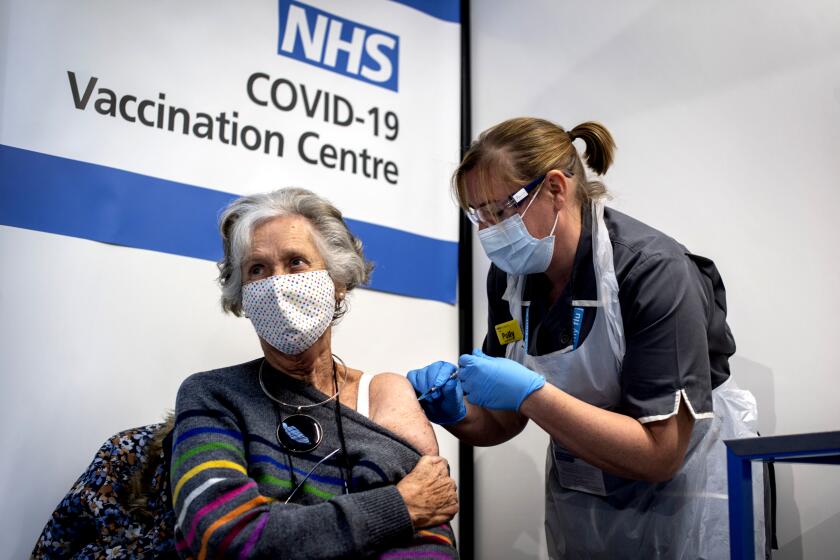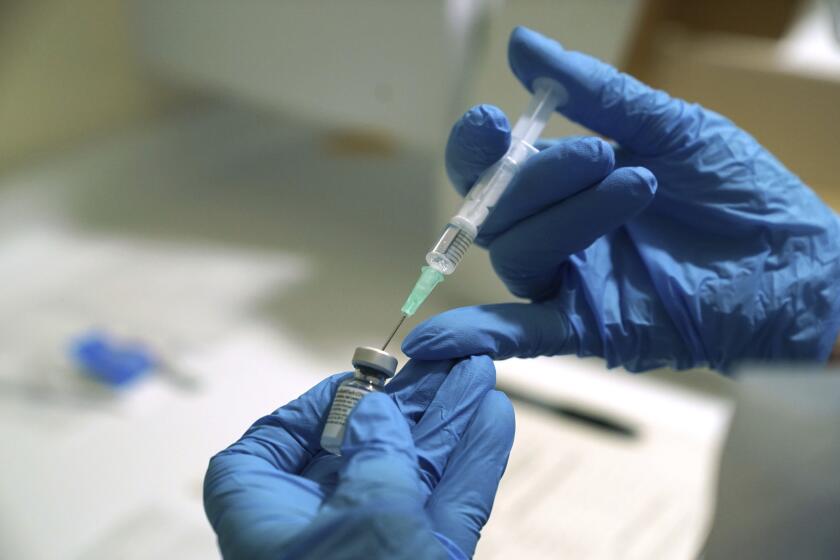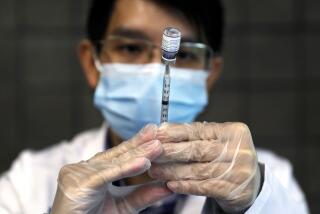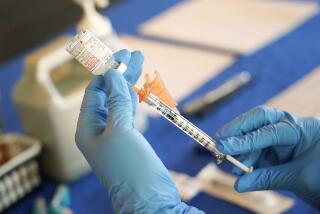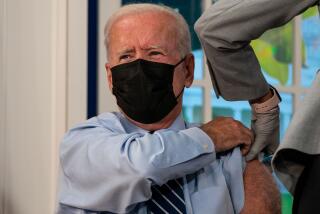U.S. embraces COVID-19 vaccines, improving odds of herd immunity
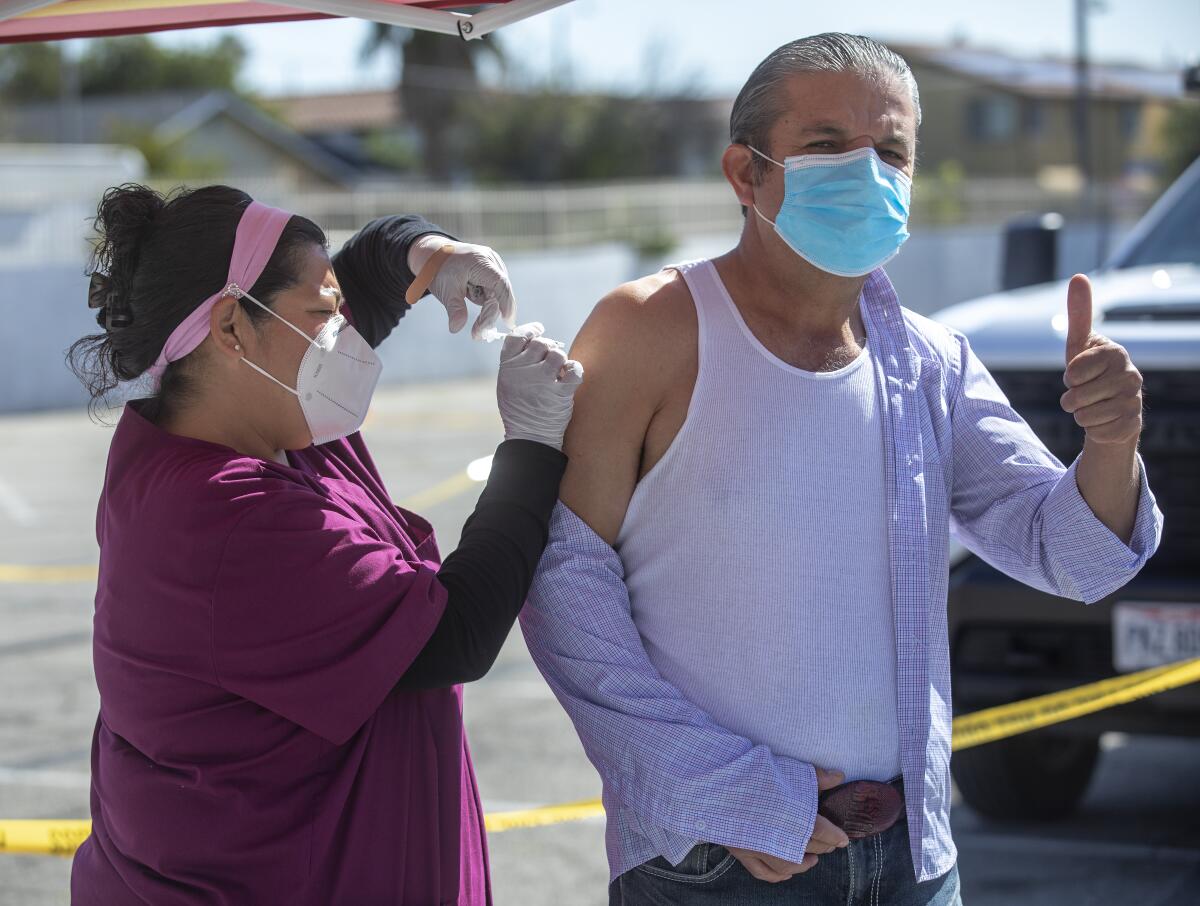
- Share via
More Americans are warming up to COVID-19 vaccines, with 19% saying they’ve already received at least one dose and 49% expressing intent to do so when they get the chance, according to new poll results.
Altogether, 69% of U.S. adults surveyed by the Pew Research Center now intend to become vaccinated. That’s up from 60% in November and 52% in September.
Still, 15% of respondents said they “definitely” wouldn’t get a COVID-19 vaccine and another 15% said they would “probably” pass up the shots.
Epidemiologists estimate that up to 85% of the country will need to be vaccinated in order to achieve herd immunity against the coronavirus. At that point, the virus will have difficulty finding new hosts to infect, and the outbreak will come to an end.
Nearly 29 million Americans have had coronavirus infections, according to data compiled by Johns Hopkins University. But experts at the Centers for Disease Control and Prevention say even those who have recovered from an infection should get vaccinated because the protection is likely to be more long-lasting.
More than half of those surveyed — 58% — said that the emergence of new coronavirus variants has increased the urgency for Americans to get vaccinated. Strains from South Africa and Brazil were less susceptible to vaccines in clinical trials, and others — including one that emerged in California — have shown signs of vaccine resistance in laboratory tests. Health officials have also urged vaccination as a way to get ahead of more transmissible strains, such as the one from the United Kingdom.
Black Americans in particular said they were concerned about the possibility that new variants will hinder the country’s ability to beat back the outbreak. The survey found that 68% of Black adults agreed that the variants “will lead to a major setback for efforts to contain the disease.” That view was shared by just 51% of American adults overall.
Indeed, the survey revealed that Black Americans are more likely to feel personally threatened by the pandemic. For instance, 35% said they were “very concerned” that they would become sick with COVID-19 and wind up needing hospital care; 21% of adults overall said they felt that way. In addition, 42% of Black adults said they were “very concerned” that they might spread the virus to someone else without even realizing they were infected; 30% of adults overall had this fear.
Just one dose of the Pfizer-BioNTech vaccine was 60% to 70% effective at preventing symptomatic COVID-19 disease in people age 70 and older, a new report says.
There’s a basis for this heightened concern. Black Americans are significantly more likely than Americans as a whole to know someone who has died of COVID-19 or been sick enough to require hospitalization, by a margin of 78% to 67%. A report last month from the CDC’s National Center for Health Statistics found that life expectancy for Black Americans fell by 2.7 years in the first half of 2020. (It also fell by 1.9 years for Latinos and 0.8 years for whites.)
This may help explain the sharp increase in the percentage of Black Americans who see COVID-19 vaccines as part of the solution. As of February, 15% of Black adults surveyed said they had received at least one dose of vaccine, and another 47% said they “definitely” or “probably” would get vaccinated. That adds up to 62% embracing the vaccine — way up from 42% in November.
Although support for COVID-19 vaccines is still lower among Black Americans than other racial or ethnic groups, the gap is now much narrower than it used to be.
In May, the proportion of Black adults who said they’d get vaccinated was 20 percentage points lower than for white or Latino adults, and 37 percentage points lower than for Asian Americans. By February, those gaps had narrowed to 8 percentage points compared with white adults, 9 percentage points compared with Latinos and 30 percentage points compared with Asian Americans.
Mixing and matching doses of different COVID-19 vaccines was an idea that scientists dismissed out of hand. Now they’re taking it seriously.
Though Americans’ views on vaccines may be converging along racial and ethnic lines, they’re moving farther apart politically. In February, 83% of Democrats and those who lean toward the party said they’d received at least one dose of vaccine or intended to get it. That compares with 56% of Republicans and those who lean toward the GOP — a difference of 27 percentage points. In November, 69% of those on the left and 50% of those on the right said they intended to get vaccinated — a 19 percentage-point gap.
That partisan gap is also reflected in Americans’ views on the health threat posed by the coronavirus in general: 82% of those on the left said the pandemic is a “major threat” to the U.S. population, compared with 41% of those on the right.
Despite this, 66% of Republicans and Republican leaners agreed that getting vaccinated against COVID-19 would help get the U.S. economy back on track. That view was shared by 87% of Democrats and Democratic leaners, the survey found. Overall, 51% of American adults said vaccination would help “a lot” and 25% said it would help “a little.”
The findings are based on surveys conducted with 10,121 adults during the third week of February.
